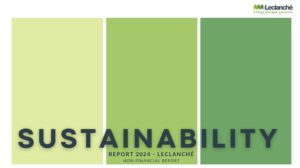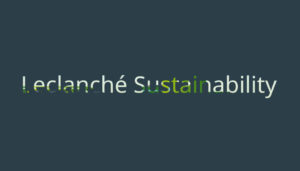Sustainability
Leclanché provides key technology to reduce the environmental impact of our customers for cleaner mobility and energy production. Further to this, we are constantly striving to find ways to reduce our own ecological footprint, at both company and product level.
Environmental Impact
Circular economy
A circular economy is an economic system based on the reuse and recycling of materials in a sustainable and environmentally friendly way.
Reduced Environmental Impact
Leclanché uses a unique water-based process for cell manufacturing which replaces the need for toxic solvents.
We carry out a thorough evaluation of the environmental impact of our batteries, as well as company-wide green-house gas (GHG) emissions, both direct and indirect.
Health & Safety
The health and safety of Leclanché’s employees and stakeholders is a key priority for us.
Certified Safety at Every Site
Leclanché is certified in accordance with ISO 45001 for both production sites in Willstätt and Yverdon-les-Bains. ISO 45001 is the standard for management systems for occupational health and safety. It aims to reduce occupational injuries, promoting and protecting physical and mental health.
Sustainability Report
Leclanché is proud to present its second Sustainability Report, showcasing progress made in 2024 toward strategic Environmental, Social, and Governance (ESG) alignment. The report highlights strong ESG progress in 2024, including updated Greenhouse Gas (“GHG”) emissions data (Scopes 1, 2, and 3) and integration of ESG principles into its ISO-certified systems. The company is expanding its sustainability framework from the 6R (typically includes Reduce, Reuse, Recycle, Recover, Redesign, Remanufacture) to a comprehensive 12R strategy, covering circularity, value chain responsibility, and emissions reduction, while aligning with key regulations like Sustainable Finance Disclosure Regulation (SFDR), Corporate Sustainability Reporting Directive (CSRD), European Battery Regulation) for phased implementation through 2035.
A cross-functional initiative was launched to foster a sustainability-driven culture and strengthen stakeholder engagement. Leclanché’s PFAS-free and water-based battery technologies support environmental goals and anticipated regulations. In 2025 and beyond, the focus will be on executing department-level 12R action plans, enhancing sustainability metrics, and accelerating decarbonisation, reinforcing its commitment to transparency, innovation, and long-term value creation.
Read the 2024 report here.
Sustainability Videos
Learn more about the new European Battery Regulation. In this series, Ana Tiago and Cyril Carpentier focus on key topics of the new European Battery Regulation and make them simple and easy to understand.


